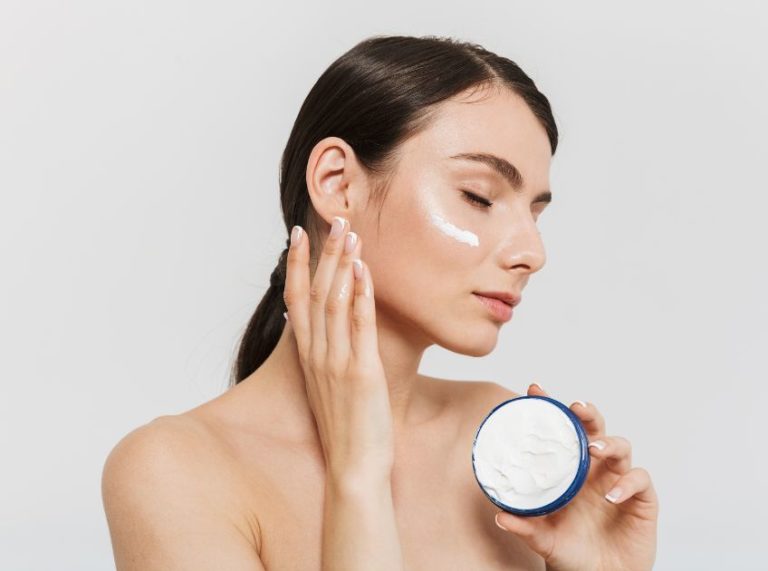
Important: This article is for informational purposes only. Please read our full disclaimer for more details.
Is using lactic acid and AHA together a good option? The analysis displays the compatibility of lactic acid and AHAs, revealing the secrets of effective skincare.
So, if you wonder, can I use lactic acid and AHA together, keep reading to find answers to your queries and the science behind both these power ingredients.
Lactic Acid
Lactic acid (1) is extracted from sour milk and is milder. Therefore, it is more appropriate for sensitive skin. Lactic acid is an AHA that helps to remove dead skin cells easily. It dissolves the bonds that hold them together. At the same time, it supports the stimulation of collagen production to minimize fine lines and wrinkles.
Lactic acid is a mild exfoliant less likely to irritate the skin than other AHAs, such as glycolic acid. It can help to improve the texture and tone of the skin.
Due to its beneficial properties, this acid is present in many skincare products. The products include cleansers, toners, serums, and masks.
Using Lactic Acid for Skincare

Before embracing lactic acid into your daily skincare routine, start with a low concentration of around 5%. Do a patch test before applying in to your face. Start by applying the products once or twice a week. Then, as your skin adjusts, gradually increase the frequency of application.
During the day, always use moisturizers and sunscreen, as lactic acid can make your skin more sensitive to the sun.
Although lactic acid can be used on all skin types as long as it is used correctly. It is a good choice for those who have dry or sensitive skin.
AHAs
Alpha hydroxy acids (2) are a class of water-soluble acids. They are commonly used in skincare products to exfoliate the skin. AHAs break down the bonds between the dead skin cells, making them quickly shed off. They can also stimulate collagen production to minimize wrinkles and fine lines.
There are many types of AHAs, including:
- Glycolic acid (derived from sugar cane)
- Lactic acid (derived from milk)
- Citric acid (derives from citrus fruits)
- Malic acid (derived from apples)
AHAs help improve overall appearance, like skin tone and texture. They encourage an even skin tone and diminish the appearance of aging signs.
Using AHA for Skincare
A few of the skincare products that contain AHAs are cleansers, toners, serums, and masks. Always use a moisturizer and sunscreen after an AHA, which makes the skin very sensitive. They are safe for all skin types.
AHAs should also be avoided by people who have skin conditions such as rosacea and eczema.
Can Lactic Acid and Ahas Be Used Together?
Combining lactic acid and AHAs (alpha hydroxy acids) is a great way to boost exfoliation.
It targets different layers of skin. At the same time, it improves the absorption of other skincare products, and addresses multiple skin conditions.
How to Use Lactic Acid and Aha Together?
To avoid irritation when combining lactic acid and AHAs, start slowly and do a patch test prior to use. To include these ingredients into your skincare routine, start with a low concentration. If you want to include lactic acid and AHAs in your skincare routine, use them on different days.
You could also apply them alternately in morning and nighttime skincare regimens. For example, you could use a lactic acid serum one night and an AHA toner the next. You could also use a lactic acid product in the morning and an AHA product at night.
It is essential to keep an eye on how your skin is responding and to modify your routine as necessary. You should cut back on the frequency or the concentration of the exfoliant if you experience any irritation or sensitivity symptoms like redness, itching or flaking of skin.
Potential Benefits of Combining Lactic Acid and AHAs
- Enhanced exfoliation
- Improved texture and tone
- Reduces the wrinkles and fine line
- Increased hydration
- Improved absorption of other skincare products
Tips for Safely Incorporating Lactic Acid and AHAs in Your Skincare Routine
Here are some pointers to keep in mind if you want to add lactic acid and AHAs in your daily skincare routine safely and effectively.
- Patch test
- Start slowly, like twice a week
- Follow instruction carefully
- Use sunscreen
- Do not over exfoliate
- Monitor your skin
Conclusion
It is important to know that everyone’s skin is unique. What works for one person may not work for another. As with any new skincare product or routine you start, start slowly.
Keep monitoring your skin’s reaction to avoid any irritating or over-exfoliating it. If you have sensitive skin or prone to irritation, start with a lower concentration of lactic acid and AHAs. Do not forget to perform a patch test before starting any new skincare product.
Image Source : canva
Related Articles
- Lactic Acid Vs Retinol – Which Is Better?
- Can You Use Lactic Acid And Niacinamide Together?
- Lactic Acid Vs Glycolic Acid: What’s the Difference?
- How to Use Lactic Acid and Retinol Together















